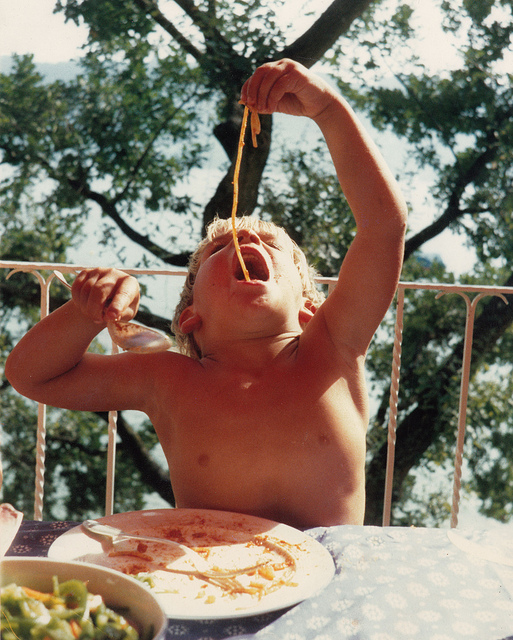One of my favorite romantic comedies is Kate and Leopold.
I’ve always loved period pieces, so I wasn’t surprised that I was a fan after watching it—but what might be a bit odd is my favorite scene: Kate sits at her kitchen table while a delicious breakfast of eggs, toast, and fruit is served to her by Leopold. Burned out, ambitious Kate sighs with appreciation and starts to eat with tears forming in her eyes.
“Thank you. Thank you,” she murmurs through bites.
I cry.
Every. Single. Time.
I used to think it was because it was such a sweet gesture—after all, what woman wouldn’t like to be served breakfast by Hugh Jackman?
But I’ve come to believe that it stirs a deeper longing inside of me, the one that understands that food should be enjoyed, relished, and be a part of the beauty of living.
Because for most of my life, food and I have been at war.
I began to eat emotionally at a young age. Instead of just having a few cookies, I can remember eating the creamy center out of about 30 Oreo cookies. (A crime, I know.) I justified this act by telling myself that because I was only eating the center, it was okay.
For some reason, eating the center out of 30 Oreo cookies = okay. But having just one or two = bad.
I was maybe 10 years old.
This disordered way of viewing food, the shame and need to justify, is something I’ve done since I can remember.
I’ve either been restricting it or eating too much of it. I’ve been on the winning side of that war and the losing side.
But, really, there are no winners when you make food your enemy.
Waving The White Flag
About two years ago, I’d found the courage to pursue a new life path, but I was also at the highest weight of my life (including all three of my pregnancies.) I had always been active, exercising during my lunch break and doing at-home workouts, but that wasn’t enough to counteract the effects of a sedentary desk job and my emotional eating.
As I thought about what it meant to be in the healing and helping professions, it became very hard for me to feel like I was helping my clients when I was myself at a very unhealthy place in life.
I knew that an important part of owning my truth and reclaiming my life was going to be addressing my unhealthy relationship with food.
I knew that in order to get to the healthiest me possible, I had to sign a treaty to end the war.
My relationship with food improved, along with my health, when I started to work on my mindset around food and all that it meant to be well in this world.
As I began to peel back the layers and live more authentically, I no longer needed food to fill that emptiness I felt. Instead, I filled that hole with meaning and purpose.
As I started to manage my stress better, I didn’t need to use food as a sedative. Meditation and other mindfulness practices like Yoga gave me the tools I needed to arm myself against mindless binging.
And when I finally stopped viewing food as something that had to be controlled or defeated, I was able to release the shame and judgment associated with it.
Today, if I want to eat a cookie, I have one or two or three. And I don’t feel guilty about it.
You’ve heard that the reasons diets don’t work is because eating better is a lifestyle change. But, what does that really mean?
I think getting healthy or well or losing weight or however you want to package it, is really about radical self-love, self-care, and self-acceptance.
Getting our outsides healthy starts within. In order to heal the unhealthy relationship I had with food, I had to dig deep inside.
With self-love comes the innate desire to care for the self and through this care and love ultimately comes acceptance.
What are some steps I took to love myself back to life losing over 70 pounds in the process? Here are five that came up to the surface when I really thought about how I was able to surrender and give up the battle to finally make peace with food.
Forgiveness.
I had to examine my life and forgive myself for all the ways I’d let my obsession with food control my emotions. I had to forgive myself for getting to such an unhealthy state. When we give ourselves grace, that opens the door to healing.
Re-framing my relationship with food.
I had viewed food as the enemy all of my life and the only thing that had gotten me was added pounds and more insecurity. Instead of viewing food as the enemy, I know recognize it as nourishment.
Food is energy, not the enemy.
Practicing mindfulness.
I promise if you take the time to listen to your body, it will give you answers. On top of added pounds, I had struggled with mystery digestive issues my entire life. When I began to quiet my mind, I was able to eliminate problematic foods from my diet and heal from the inside out.
Quality over quantity.
If you’re like me, you love to eat. Eating should be one of life’s pleasures. In order to make peace with food, I started to have a love affair with it. I experimented with healthy recipes and started to take enjoyment out of my meals. Eating healthy does not mean you have to deprive yourself.
Plus, when I choose clean, healthy food, I can eat more of it so I don’t feel deprived.
Energy management.
As a highly sensitive person, managing my energy is absolutely essential if I want to keep a healthy mindset—around everything, not just food. Poor stress management is a hallmark of emotional eating. Managing your energy will look different for you, but for me, being in nature, Yoga and meditation are the ways I give myself time to recharge.
It was my personal journey back to health that really inspired me to train as a wellness coach and pay it forward by helping other women make peace with food and live their best lives. Now, it’s my passion to help other women take back their power and start to believe they are worth their dreams, their health, and their passions.
When you put these practices into place, you will reclaim a healthier, more joyful life.
Author: Jennifer Rayne Milburn
Editor: Renée Picard
Image: mhaller1979 at Flickr












Read 1 comment and reply